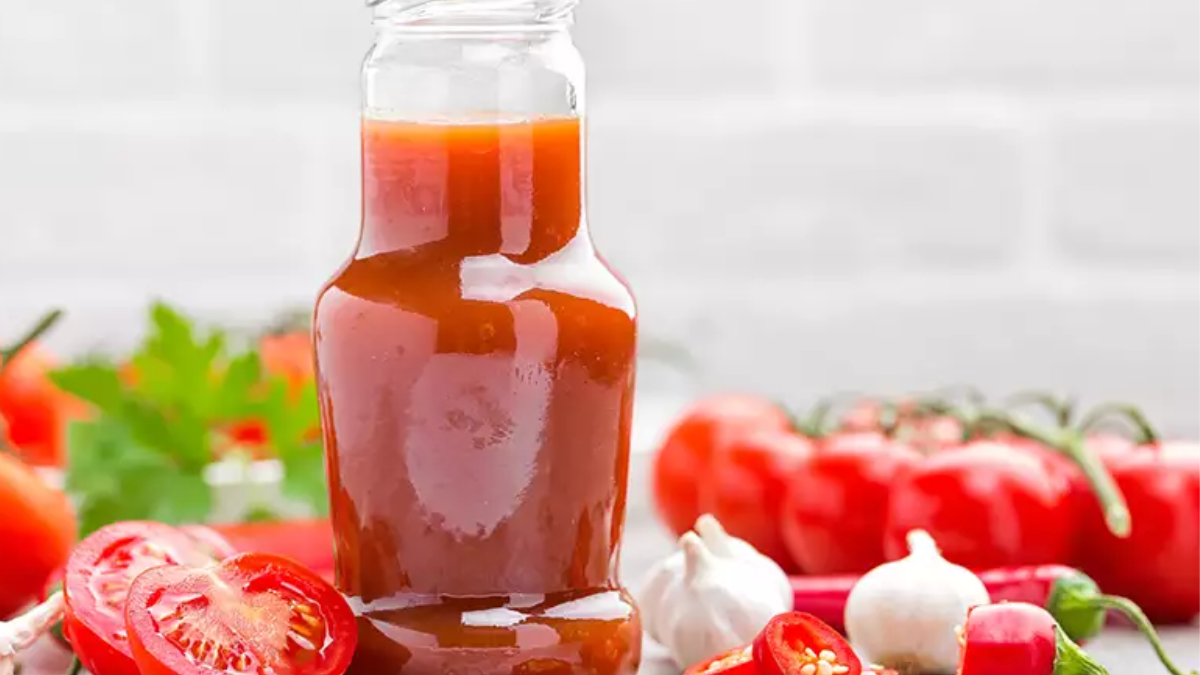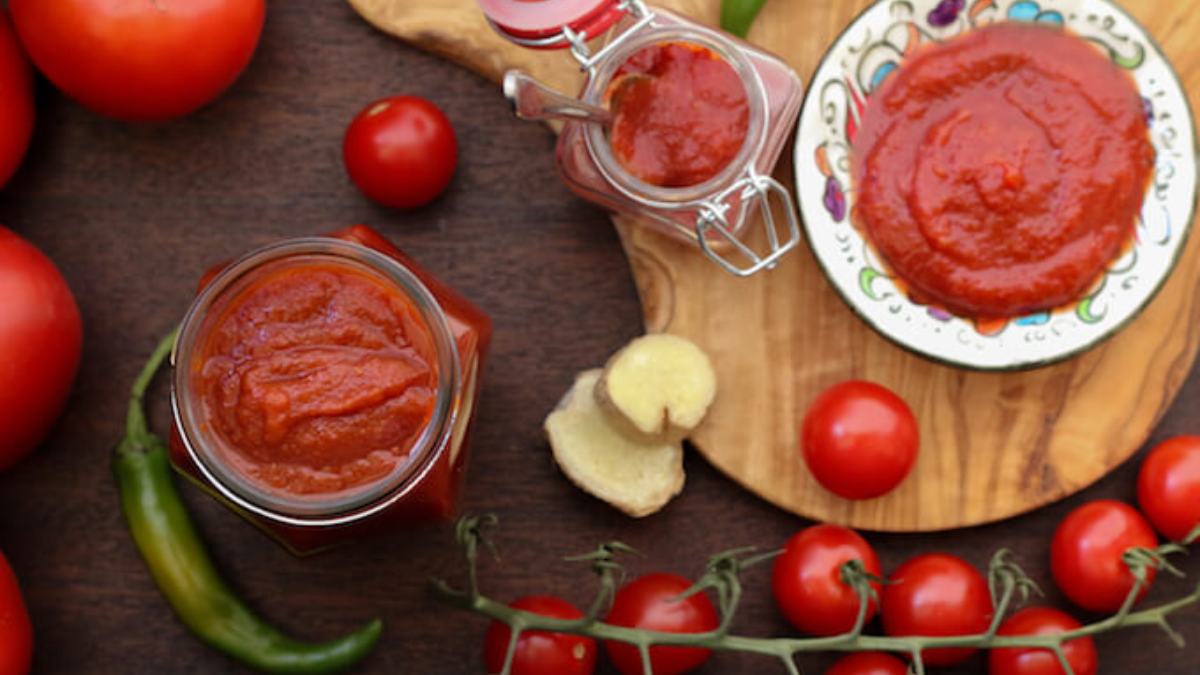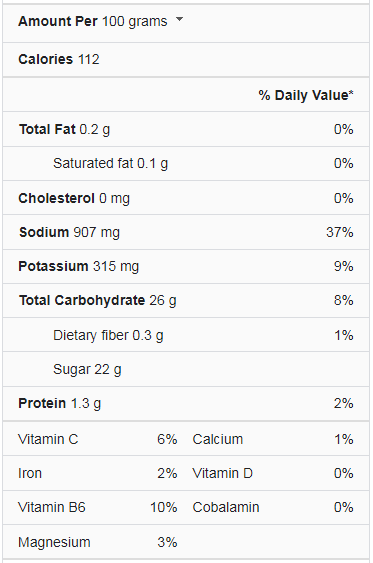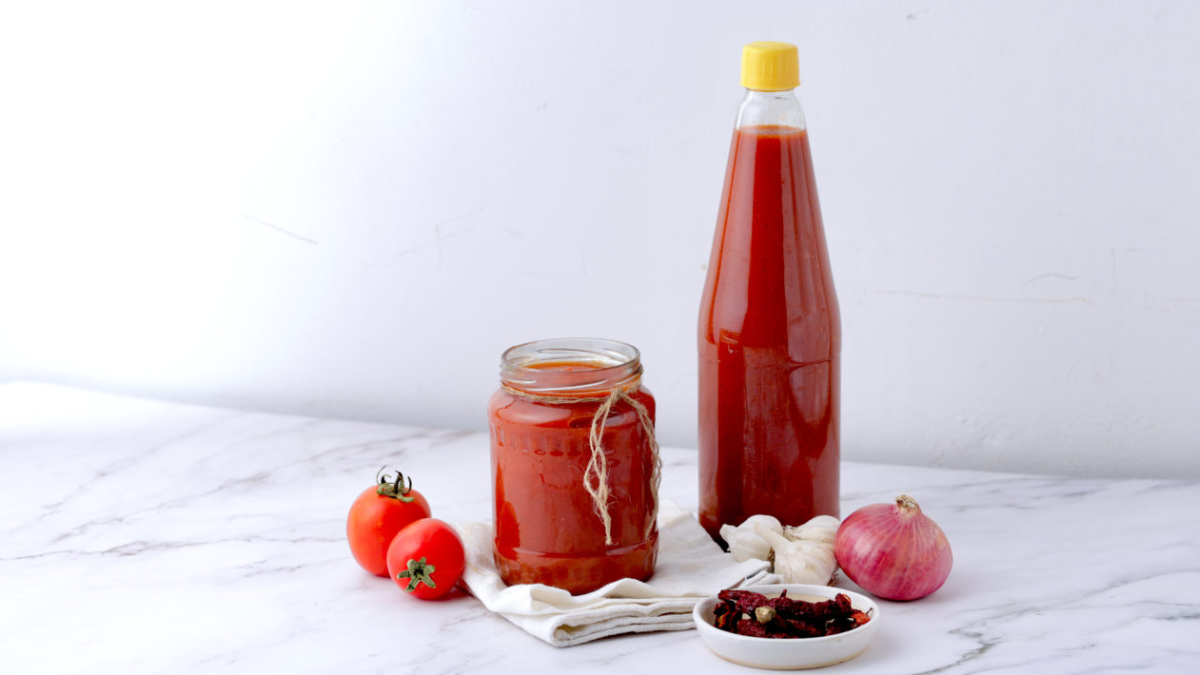You’ll want more of this delicious, colorful, homemade tomato ketchup or sauce. With a variety of appetizers, including sandwiches, pizza, French fries, and hamburgers, tomato ketchup is a favorite condiment and dip. Children enjoy rolling their sandwiches and bread or combining it with other foods to customize the flavors to their preferences. It’s a mouthwatering treat that all ages adore and will have you licking your lips.
It is a vibrant crimson mixture. It is slathered and squirted across our favorite foods and is simultaneously savory and sweet with the perfect amount of puckering twang. Even refrigerators with empty shelves have lingering bottles that clang when the door is opened. Ketchup is the unsung hero of American sauces.
Tomato Ketchup Nutrition Facts
What is Exactly Tomato Ketchup?
Whether you spell it Ketchup, Catchup, or Catsup, it’s delicious! Highly spiced with salt, pepper, and other seasonings, then cooked into a thick liquid and sieved to create a thick, silky sauce. Ketchup is used over a wide variety of foods, including eggs, hash browns, mashed potatoes, hamburgers, fries, and so much more.
Tomatoes are used to make ketchup, which also offers a lot of health advantages. Tomato concentrate, spirit vinegar, corn syrup or another type of sugar, salt, spice and herb extracts (including celery), and spice and garlic powder are the components of standard modern ketchup. There may also include veggies, onion, and spices like allspice, cloves, and cinnamon.
Who Created Ketchup?
Ketchup wasn’t traditionally made using tomatoes. The early kinds of ketchup were made from fruit, nuts, fish, or mushrooms. Ketchup was a term used to describe a variety of thick sauces before the 19th century. In 1812, a scientist from the United States by the name of James Mease is credited with creating tomato-based ketchup. His recipe was improved over time, and in 1876 the renowned corporation Heinz introduced its adored bottled ketchup. With annual sales of more than 650 million bottles, Heinz continues to dominate ketchup manufacture.
How to Make Tomato Ketchup?
Here is the best tomato ketchup recipe:
Ingredients
- 2 (28 ounce) cans crushed tomatoes
- ½ cup water, divided
- ⅔ cup white sugar
- ¾ cup distilled white vinegar
- 1 teaspoon onion powder
- ½ teaspoon garlic powder
- 1 ¾ teaspoons salt
- ⅛ teaspoon celery salt
- ⅛ teaspoon mustard powder
- ¼ teaspoon finely ground black pepper
- 1 whole clove
Directions
Here are the steps of making tomato ketchup:
- Fill the slow cooker with tomatoes. Each can should be emptied, then 1/4 cup of water should be poured into the slow cooker. Whisk together the sugar, vinegar, onion, celery, garlic powders, salt, mustard powder, black pepper, cayenne pepper, and whole clove.
- Cook mixture on High, uncovered, for 10 to 12 hours, or until mixture is very thick and reduced by half. About every hour, stir.
- To make the ketchup’s texture smoother, mix it for around 20 seconds using an immersion blender.
- To remove any skins and seeds, ladle the ketchup through a fine strainer and press the mixture with the back of the ladle.
- Place the bowl with the strained ketchup in. Complete cooling.
- Cayenne pepper, black pepper, and salt should all be tasted and adjusted as needed.
What’s the Difference Between Tomato Sauce & Ketchup?
We frequently confuse the terms “tomato sauce” and “tomato ketchup,” although they are not the same thing. According to food historians, ketchup is a type of sauce. The name “ketchup” is derived from the Chinese character “koechiap,” which means “fish brine” or, more generally, “spicy sauce.” The Latin word salsas, which means “salted,” is the source of the English term “sauce.”
- Historians assert that there were numerous factors involved in the creation of the sauce. It was used as a cooking medium, considered to be a meat tenderizer, and has the capacity to enhance flavors.
This versatile dish’s type and flavor vary from culture to culture because there is no set recipe for it. - Due to research and commercialization, the sauce has become a common household item, and many individuals now produce different kinds of sauces at home.
- Depending on how they are used, sauces can have a range of viscosities. For example, a dressing will have a high viscosity while a sauce used for cooking will have a low viscosity. Tomatoes, sugar, vinegar/acetic acid, and spices are used to make ketchup.
- Tomato sauce, on the other hand, is made using oil, a stock made of either meat or vegetables, and spices. Never does it utilize vinegar. Additionally, all sauces are served hot, whereas ketchup is cold by nature and never is.
- Ketchup is produced with a variety of spices to make it easier to understand, whereas sauce is typically made without spices. Another significant distinction between tomato sauce and ketchup is that the former typically lacks sugar while the latter contains both sugar and other sweet spices in measured amounts. To learn more about the history of tomato sauce and the main distinctions between it and ketchup, read on.
Origin
The name “ketchup” comes from the Chinese word “koechiap,” which means “fish brine” or, more commonly, “hot sauce.” The word “sauce” comes from the Latin word “salsas,” which means “salted.” According to legend, ketchup was first created in the seventeenth century and was a close relative of a sauce with the major ingredients of fish brine, herbs, and spices. The phrase was used to describe any sauces having vinegar as one of the main ingredients in the eighteenth and nineteenth centuries. And tomato juice wasn’t even a factor until the early 20th century.
Key Differences
Tomatoes, sugar, vinegar/acetic acid, and spices are used to make ketchup. On the other hand, tomato sauce never contains vinegar and is instead made from tomatoes, oil, meat or vegetable stock, and spices. Additionally, all sauces are served hot, whereas ketchup is cold by nature and never is. You might think of it this way to make it easier to understand: the sauce is typically created without spices, but ketchup is made with a variety of spices. Another significant distinction between the two is that whereas ketchup has a particular quantity of sugar and other sweet spices, sauce typically does not.
What are the Health Benefits of Tomato Ketchup?
Very little amounts of foods like ketchup are unlikely to have a significant effect on your health. However, some publications extol the virtues of ketchup in terms of health. Examining the assertions and the science supporting them can be beneficial. Many times, the research presented doesn’t genuinely back up ketchup’s health advantages.
Reduced Risk of Prostate Cancer
A 2010 study looked at the connection between the risk of prostate cancer and foods containing tomatoes. Researchers hypothesized that anticancer phytochemicals found in tomato-based products may affect men’s cancer risk levels. Additionally, they proposed that novel tomato-based food items, commonly referred to as functional foods, might be created to combat prostate carcinogenesis.
The only mention of ketchup in the survey is that it accounts for 15% of all tomato-based products consumed in the United States together with tomato juice. According to the experts, regular ketchup use has no impact on the incidence of prostate cancer.
Reduced Risk of Cardiovascular Disease
Tomatoes’ lycopene is linked to a lower risk of heart disease. In contrast to healthy volunteers, one study found that patients with cardiovascular disease benefit from lycopene supplementation in terms of endothelial function. However, these researchers only looked at the component lycopene and not the effects of tomatoes or diets containing tomatoes. Therefore, it is uncertain whether or not those who drink ketchup in usual amounts will benefit from this.
May Decrease LDL
Increased risk of heart disease can result from high levels of low-density lipoprotein (LDL), generally known as “bad” cholesterol. Lycopene may be helpful in lowering the risk of cardiovascular disease, while a separate study has revealed that tomato juice may lower LDL levels. According to this study, adding tomato juice to one’s diet can improve both LDL and HDL (“good” cholesterol). Further studies are required to determine how ketchup affects cholesterol levels because the results were linked to tomato juice rather than ketchup.
Side Effects of Tomato Ketchup
When used sparingly, ketchup is generally considered to be completely safe. You may easily add the condiment to a diet that is well-balanced.
Nevertheless, consuming too much ketchup may have some minor adverse effects.
The following are possible ketchup drawbacks:
- It’s fairly high in sugar. 1 tablespoon of ketchup could contain 7% or more of your DV of sugar. If you love ketchup and have 4–5 Tablespoons with a single meal, you could consume 35% or more of the DV for sugar from the ketchup alone.
- It’s fairly high in salt. Most packaged ketchup products are also high in salt. If you’re sensitive to salt, eating too much salt may contribute to high blood pressure, heart disease, and other health concerns.
- It’s acidic food. Tomatoes prove a highly acidic food, so concentrated tomato products like ketchup are no different. If you suffer from heartburn or reflux, eating too much ketchup could worsen those conditions.
- Some people may be allergic. Though uncommon, it is possible to have an allergy or sensitivity to ketchup. A ketchup allergy could be caused by tomatoes or other ingredients in the condiment like vinegar that contains sulfites, salicylates, and gluten
What are the Alternatives to Ketchup?
When used in moderation, ketchup can be a component of a balanced diet, but there may be instances when you’d prefer to substitute a healthier option.
There are numerous brands and variations of ketchup available, so there is a strong chance you can discover one that matches your demands if you’re seeking one.
For instance, numerous ketchup manufacturers provide the following varieties of the condiment:
- organic
- unsweetened
- no high fructose corn syrup
- low in salt
- gluten-free
- non-GMO
The majority of labels clearly state these distinctions if you’re seeking a variety like this. Maybe you enjoy the tomato flavor of ketchup but would prefer a less processed option. You might try creating your own at home in that case.
Conclusion
A sweet and tangy condiment is ketchup. Tomatoes that have been pureed with seasonings like garlic, onion, and allspice are used to make it. Your favorite comfort meals like hamburgers, hotdogs, and french fries work nicely with ketchup as a topping. Despite being prepared from tomatoes, a meal that is quite nutritious but is frequently linked with fast food.
If you’ve ever questioned whether ketchup is healthy, you’re not alone. You might enjoy ketchup with your sandwiches, burgers, french fries, and other foods. If you like ketchup, you might be glad to know that it contains lycopene as tomatoes are used in its production.
Increasing your lycopene intake may help shield you against cancer, heart disease, and other degenerative diseases. Some ketchup variations, however, turn out to be rich in sugar and salt. Furthermore, if you have acid reflux, gluten-related problems, or tomato allergies, some of the components in ketchup might make your stomach feel worse.



